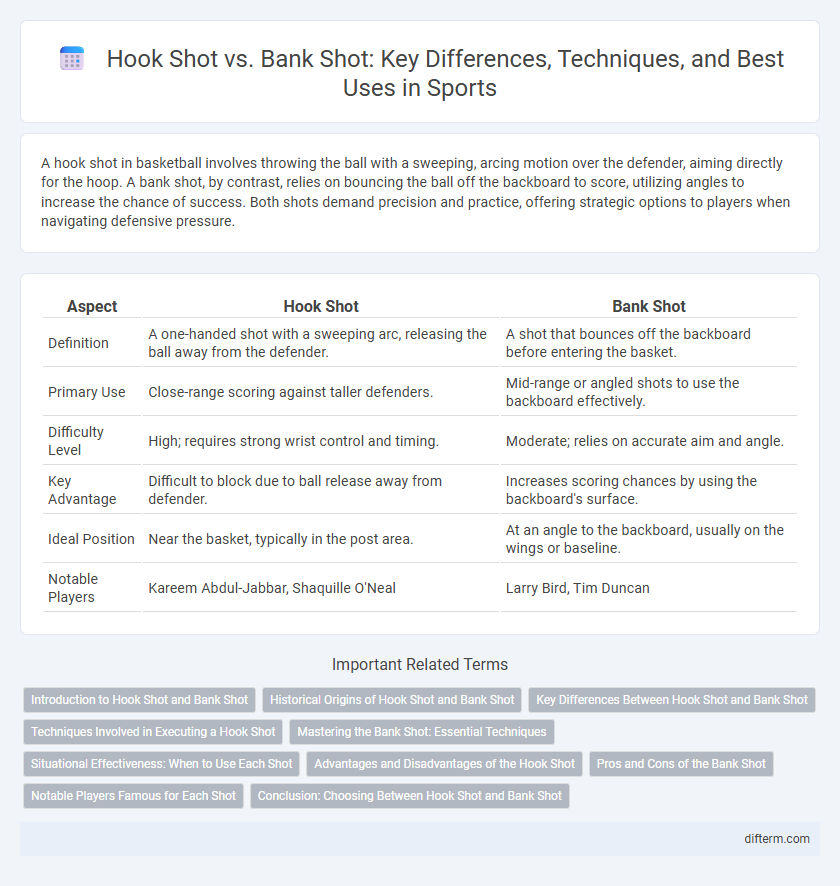A hook shot in basketball involves throwing the ball with a sweeping, arcing motion over the defender, aiming directly for the hoop. A bank shot, by contrast, relies on bouncing the ball off the backboard to score, utilizing angles to increase the chance of success. Both shots demand precision and practice, offering strategic options to players when navigating defensive pressure.
Table of Comparison
| Aspect | Hook Shot | Bank Shot |
|---|---|---|
| Definition | A one-handed shot with a sweeping arc, releasing the ball away from the defender. | A shot that bounces off the backboard before entering the basket. |
| Primary Use | Close-range scoring against taller defenders. | Mid-range or angled shots to use the backboard effectively. |
| Difficulty Level | High; requires strong wrist control and timing. | Moderate; relies on accurate aim and angle. |
| Key Advantage | Difficult to block due to ball release away from defender. | Increases scoring chances by using the backboard's surface. |
| Ideal Position | Near the basket, typically in the post area. | At an angle to the backboard, usually on the wings or baseline. |
| Notable Players | Kareem Abdul-Jabbar, Shaquille O'Neal | Larry Bird, Tim Duncan |
Introduction to Hook Shot and Bank Shot
The hook shot in basketball is a high-arching, one-handed shot typically executed with the dominant hand while the player's body shields defenders. The bank shot involves aiming the ball off the backboard's glass surface to increase scoring accuracy, often used in close-range attempts. Both techniques require precise angle control and timing to maximize scoring opportunities against defensive pressure.
Historical Origins of Hook Shot and Bank Shot
The hook shot, popularized by basketball legends like Kareem Abdul-Jabbar in the 1960s, originated as a strategic maneuver to shoot over taller defenders with a sweeping arm motion. The bank shot, one of the oldest basketball techniques, dates back to the early 1900s and involves bouncing the ball off the backboard to increase scoring accuracy. Both shots have evolved with advances in player skill and court technology but remain fundamental in basketball's offensive arsenal.
Key Differences Between Hook Shot and Bank Shot
The key differences between a hook shot and a bank shot primarily lie in the shooting technique and angle of release. A hook shot is characterized by a sweeping, curved arm motion with the ball released on the shooter's dominant side, often used to evade defenders, while a bank shot involves aiming the ball off the backboard to increase scoring chances. The hook shot is typically executed closer to the basket and side-on to the hoop, whereas the bank shot can be taken from various angles and distances, utilizing the backboard's surface as a target.
Techniques Involved in Executing a Hook Shot
Executing a hook shot in basketball involves a distinctive one-handed spinning motion where the shooter extends their arm to release the ball high above the head, creating a difficult angle for defenders to block. The shooter's body typically faces sideways to the basket, using the non-shooting arm to shield from defenders while maintaining balance and control. Proper foot placement, combined with a fluid wrist snap, ensures accuracy and a soft touch, making the hook shot an effective scoring technique in close-range situations.
Mastering the Bank Shot: Essential Techniques
Mastering the bank shot requires precise angle calculation and understanding the backboard's surface for optimal rebounds. Players must develop consistent wrist control and release timing to ensure the ball hits the target area with the ideal spin and force. Practicing shots from various spots on the court enhances spatial awareness and improves scoring efficiency using the bank shot technique.
Situational Effectiveness: When to Use Each Shot
The hook shot is most effective in close-range, contested situations near the basket, offering a high-arc release that reduces the chance of blocks. The bank shot excels when shooting from sharp angles or surface-proximate areas, utilizing the backboard to increase scoring chances by controlling the ball's entry path. Players optimize scoring by selecting hook shots in traffic and bank shots when angle and surface alignment create higher percentage opportunities.
Advantages and Disadvantages of the Hook Shot
The hook shot offers significant advantages such as a high release point that makes it difficult for defenders to block and effectiveness in close-range scoring situations, especially when facing taller opponents. However, its disadvantages include a slower execution time compared to other shots and a steeper learning curve demanding precise hand-eye coordination and timing. Players who master the hook shot can exploit mismatches, but inconsistent accuracy and limited versatility can reduce its effectiveness in fast-paced offensive plays.
Pros and Cons of the Bank Shot
The bank shot offers a high percentage scoring opportunity by using the backboard to increase the margin for error during a basketball shot. It excels in angles where direct shots are difficult, but its effectiveness decreases with poor backboard positioning or when defenders anticipate the rebound path. Players must balance the strategic advantage of controlled shot placement against the potential for slower shot execution and defensive interruptions.
Notable Players Famous for Each Shot
Kobe Bryant is renowned for his iconic hook shot, which combined finesse and precision to score against formidable defenders. Tim Duncan's mastery of the bank shot, using the backboard to his advantage, made him a dominant force in the paint throughout his NBA career. Both players have left a lasting legacy by popularizing these signature shots and influencing generations of basketball athletes.
Conclusion: Choosing Between Hook Shot and Bank Shot
Choosing between the hook shot and bank shot depends on player skill, shooting angle, and defensive pressure. The hook shot offers a higher release point and is effective against taller defenders, while the bank shot benefits from using the backboard for improved accuracy on specific court angles. Mastery of both techniques provides versatility and increases scoring opportunities in various game situations.
Hook Shot vs Bank Shot Infographic

 difterm.com
difterm.com